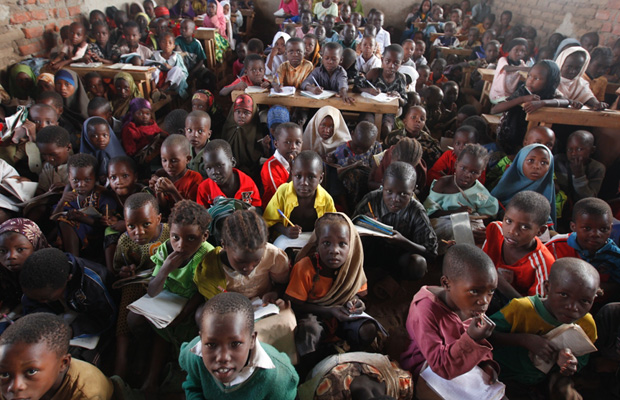Thierry Tshiswaka spent the first 23 years of his life growing up in the western part of the Democratic Republic of Congo with his family. Life in the western part was good. In 1998, Thierry, without much thought of safety or security, moved to Kivu, a province in the east of the Congo that was enveloped in war, violence and poverty (see “Kivu Conflict – Background” at the end of this story for details).
Thierry spent exactly one year in university before he had to flee for his life.
As a young teen, Thierry was involved in demonstrations that spoke out against injustices that he saw around him. As he grew into a young man he continued his stand against these injustices and became involved in a youth movement, a movement that wanted fair treatment for everyone regardless of ethnic backgrounds.
During his one year in University, Thierry became more and more involved in this youth movement. Tensions rose. There were rumors that a certain group of young people were being targeted. Friends and acquaintances around him started to go missing, some apprehended by the authorities, while others were kidnapped. No one was sure what would happen next. Thierry decided he needed to leave the Congo for his own personal safety.
When something like this is going on, they try to track some people; I thought it was wise for me to leave. ~ Thierry Tshiswaka
On a day, just like any other day, without letting his family know what was happening, Thierry left.
He only told the people in the house where he was living that he needed to leave. They helped him cross the border into Uganda where he boarded a bus to Kampala and then to Kenya.
When you are doing something like this you have to be stable because I didn’t want to call them [family] and tell them what I am going through. I didn’t want to hurt them. If I would talk to my mom…I didn’t know how she would feel. ~ Thierry Tshiswaka
For several months, Thierry’s family did not know what had happened to him. He did not contact them because the situation he was in was unstable and he did not want to worry them. The first few months in Kenya were difficult. Thierry was unable to work in Kenya because he didn’t have a work permit. He survived by working illegally for cash. Each day he would go to a corner street where people were looking for laborers. Sometimes he would find work and sometimes he didn’t. This came at a great risk to him. If he was caught working with no work permit he could be deported.
Through conversations Thierry heard about the UNHCR (United Nations Refugee Agency) and made an appointment. After Thierry told his story of fleeing his country he received refugee status in Kenya. Although refugee status came with the right to be a refugee it also denied Thierry of the very thing he needed to do to have a stable life – the right to work. The only rights that were attached to the official document were the rights to live and work within the refugee camp. Thierry didn’t know if he wanted to live in the camps. He had heard stories of how difficult life was in the refugee camp. He waited and thought about what his options were.
After a two-year stint in Nairobi, working illegally and struggling to survive, Thierry decided that life within the walls of the camp might be easier than what he was experiencing. He packed up the little that he had and made the move. Thierry become one of 55,000 refugees living in the camp hoping for a better future.
They (refugee camp) were supporting us…some food, some medical attention, some other stuff. Even though it was not enough but at least if you have a little you can manage. ~ Thierry Tshiswaka
Thierry entered the refugee camp in 2002. Once inside, Thierry had access to medical attention, some food and, most importantly, legal work. Over the first few years Thierry was one of the fortunate few who was able to find work doing odd jobs. In 2004 he also placed an application with the UNHCR to come to Canada. Soon after, the application was forgotten as Thierry looked for ways to improve his situation. The camp was looking for people to become teachers. The refugee camp in collaboration with a school in Kenya made it possible for some people to get an education. It was here that Thierry decided to go back to school to become an elementary school teacher.
Becoming educated proved useful for Thierry. Opportunities to teach within the refugee camp abounded. Thierry found himself teaching in front of classes with 80-100 children. He also found part time employment tutoring children in other areas of the camp. Although, he was paid only 10% of the wages that the nationals were paid, still Thierry was able to buy necessary things like food and clothing which kept him from being the poorest of the poor.
Poverty permeated the camp. Life was a bit easier for those who found jobs but many people had no work and could not afford necessities such as clothing or school supplies. It was frustrating to work and live in these conditions. Thierry was desperate to leave. He wanted a life where he could have a future. He started to explore other options. He called home to his family and asked if it was safe to come back.
It’s like God was telling me something… I just gave up but God told me ‘NO, you still have a chance.’ ~ Thierry Tshiswaka
It was during this time, seven years after Thierry had sent the initial application to come to Canada that he received a letter from the Canadian High Commission inviting him to an interview that would determine if he was eligible to go to Canada. Still, Thierry did not dare to dream of a different future. Many people had interviews but never received a visa to travel.
Days turned into weeks, and then months still Thierry heard nothing. Six months later he received his visa. He stared at the piece of paper in his hands and knew his life had changed forever. Excitement filled his heart and mind but this wonderful news of a future was kept quiet. Thierry only shared his good news with a close friend, not wanting to draw attention to his good fortune. Thierry had seen people who had received their visas end up dead before they ever left the camp.
He continued life in the camp as he always had, getting up in the morning, going to work, teaching those left in his care as best he could.
And then the day came, ten years after his application, Thierry silently drifted out of the lives of those around him, left the few things that didn’t fit into his bag in the mud-brick shack that he lived in, boarded a bus and left.
One week later Thierry found himself in Canada, meeting the group that had sponsored him. They helped him find a place to live, answered questions about Canada and helped find a job. Within four months of landing in Canada Thierry had the one thing that had eluded him all those years in Kenya – stability. Thierry’s goal was one of independence. He did not want to rely on others. He wanted to create the life that he had always wanted – that included continuing his education. Thierry was going to university.
In 2012, Thierry made his way to the University of Winnipeg to enroll for classes where he found out that he needed to improve his English. He spent the next six months taking English classes and then registered for university in 2013.
Thierry is pursuing a Bachelor of Social Work and continues to study part time as he supports his family and pays for his education through his full time job.
I’m glad and it is also not easy. It (going to university) is a sacrifice. We decide to do so because in the future it may help. ~ Thierry Tshiswaka
Thierry has also started saving money for his seven month old son’s education. The gift of education will be waiting for his child when he graduates from high school. He knows the difficulties and challenges of getting an education in other countries. Thierry also knows the freedom that an education brings – opportunities for jobs and a better future regardless of the circumstances that surround you, not only for yourself but for your entire community.
When you have the knowledge you can put it into practice and you can develop your community. ~ Thierry Tshiswaka
Kivu Conflict – Background
While the Democratic Republic of Congo has the natural and human resources to thrive, it has the unenviable distinction of having the lowest GDP per capita in the world – $600 compared to $53,000 in the United States. (Reference)
Continued instability has put reliable health care out of reach for many Congolese. A high incidence of sexual violence in eastern Congo also increases the demand for skilled medical care. (Reference)
It is within this context that Thierry’s story occurred.




